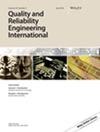考虑动态维护阈值的新型设备剩余使用寿命预测方法
IF 2.8
3区 工程技术
Q3 ENGINEERING, INDUSTRIAL
引用次数: 0
摘要
在以维护为基础的传统剩余使用寿命(RUL)预测方法中,维护阈值通常被设定为一个固定值。然而,由于退化的不确定性和其他因素,实际维护阈值可能会超过其预设值。因此,有必要考虑动态维护阈值,以提高剩余使用寿命预测的精度。通过考虑维纳过程,引入维护阈值误差来反映维护阈值的动态性质。综合考虑维护对劣化量、劣化率和劣化路径的影响,建立多阶段维护影响劣化过程模型。利用首次命中时间(FHT)推导出设备的 RUL 公式。采用最大似然估计(MLE)方法和贝叶斯理论来估计模型参数。利用模拟数据和陀螺仪退化数据对提出的方法进行了验证。结果表明,所提出的方法可以显著提高设备寿命预测的精度。本文章由计算机程序翻译,如有差异,请以英文原文为准。
A novel equipment remaining useful life prediction approach considering dynamic maintenance threshold
In conventional remaining useful life (RUL) prediction approaches grounded on maintenance, the maintenance threshold is typically established as a stationary value. However, the actual maintenance threshold may exceed its preset value due to the uncertainty of degradation and other factors. Therefore, it is necessary to consider the dynamic maintenance threshold to improve the precision of remaining useful life prediction. By considering the Wiener process, the maintenance threshold error is introduced to reflect the dynamic nature of the maintenance threshold. The influence of maintenance on degradation amount, degradation rate, and degradation path are comprehensively considered to establish a multi‐stage maintenance‐affected degradation process model. The RUL formula of the equipment is derived using the first hitting time (FHT). The maximum likelihood estimation (MLE) approach and Bayesian theory are employed to estimate the model's parameters. The proposed approach is validated using simulation data and gyroscope degradation data. The outcomes reveal that the proposed approach can significantly enhance the precision of life prediction for the equipment.
求助全文
通过发布文献求助,成功后即可免费获取论文全文。
去求助
来源期刊
CiteScore
4.90
自引率
21.70%
发文量
181
审稿时长
6 months
期刊介绍:
Quality and Reliability Engineering International is a journal devoted to practical engineering aspects of quality and reliability. A refereed technical journal published eight times per year, it covers the development and practical application of existing theoretical methods, research and industrial practices. Articles in the journal will be concerned with case studies, tutorial-type reviews and also with applications of new or well-known theory to the solution of actual quality and reliability problems in engineering.
Papers describing the use of mathematical and statistical tools to solve real life industrial problems are encouraged, provided that the emphasis is placed on practical applications and demonstrated case studies.
The scope of the journal is intended to include components, physics of failure, equipment and systems from the fields of electronic, electrical, mechanical and systems engineering. The areas of communications, aerospace, automotive, railways, shipboard equipment, control engineering and consumer products are all covered by the journal.
Quality and reliability of hardware as well as software are covered. Papers on software engineering and its impact on product quality and reliability are encouraged. The journal will also cover the management of quality and reliability in the engineering industry.
Special issues on a variety of key topics are published every year and contribute to the enhancement of Quality and Reliability Engineering International as a major reference in its field.

 求助内容:
求助内容: 应助结果提醒方式:
应助结果提醒方式:


